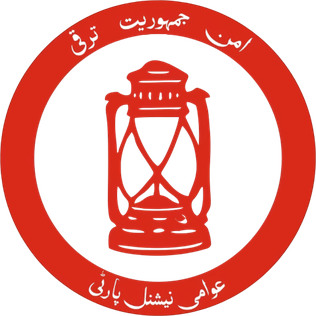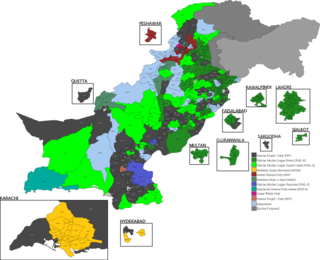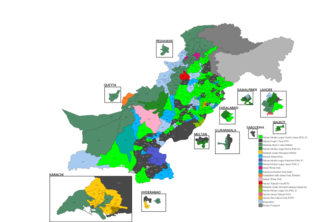Related Research Articles

The Pakistan Muslim League (Nawaz) (Urdu: پاکستان مسلم لیگ (ن), romanized: Pākistān Muslim Līg (Nūn)abbr.PML(N) or PML-N) is a centre-right and liberal conservative political party in Pakistan. Alongside the Pakistan Tehreek-e-Insaf (PTI) and Pakistan Peoples Party (PPP), it is one of the three major political parties of the country. The party was founded by former Prime Minister Nawaz Sharif after the dissolution of Islamic Democratic Alliance in 1993. The party's platform is generally conservative, which involves supporting free markets, deregulation, lower taxes and private ownership. Although the party historically supported social conservatism, in recent years, the party’s political ideology and platform has become more liberal on social and cultural issues.

The Pakistan Muslim League Urdu: پاکستان مسلم لیگ (ق); Pākistān Muslim Līg (Qāf), Acronyms: PML(Q), PML-Q, PMLQ, "Q League") is a Conservative nationalist political party in Pakistan. As of the 2018 parliamentary election, it has a representation of 5 seats. It previously served as an ally of former Prime Minister Raja Pervez Ashraf's government, and led a joint election campaign in 2013 alongside Pakistan Peoples Party (PPP) in Punjab and Balochistan provinces against its rival Pakistan Muslim League (N), a fiscally conservative and centre-right force.
{{Infobox officeholder | name = Ghulam Mustafa Jatoi | image = Ghulam Mustafa Jatoi.jpg | office = Caretaker Prime Minister of Pakistan | president = Ghulam Ishaq Khan | term_start = 6 August 1990 | term_end = 6 November 1990 | predecessor = Benazir Bhutto | successor = Nawaz Sharif | office1 = 14th Chief Minister of Sindh | governor1 = Ra'ana Liaquat Ali Khan
Muhammad Dilawar Khanji | term_start1 = 25 December 1973 | term_end1 = 5 July 1977 | predecessor1 = Mumtaz Bhutto | successor1 = Ghous Ali Shah | birth_date = 14 August 1931 | birth_place = New Jatoi, Bombay Presidency, British India
(now Naushahro Feroze District, Sindh, Pakistan) | death_date = 20 November 2009 (aged 78) | death_place = London, England, United Kingdom | resting_place = New Jatoi, Naushero Feroze | party = Pakistan Peoples Party (Before 1986)
National Peoples Party (1986–2009) | alma_mater = University of Cambridge | children = Arif Mustafa Jatoi (son)
Ghulam Murtaza Jatoi (son) | relatives = Liaquat Ali Jatoi (nephew) Ghulam Mustafa Jatoi was a Pakistani politician who served as the Caretaker Prime Minister of Pakistan for three months, from 6 August 1990 to 6 November 1990. Ghulam Mustafa Jatoi's ancestors were Murids of the Pir's of Sarhandi.

Since its establishment in 1947, Pakistan has had an asymmetric federal government and is a federal parliamentary democratic republic. At the national level, the people of Pakistan elect a bicameral legislature, the Parliament of Pakistan. The parliament consists of a lower house called the National Assembly, which is elected directly, and an upper house called the Senate, whose members are chosen by elected provincial legislators. The head of government, the Prime Minister, is elected by the majority members of the National Assembly and the head of state, the President, is elected by the Electoral College, which consists of both houses of Parliament together with the four provincial assemblies. In addition to the national parliament and the provincial assemblies, Pakistan also has more than five thousand elected local governments.

The Awami National Party is a Pashtun nationalist, secular and leftist political party in Pakistan. The party was founded by Abdul Wali Khan in 1986 and its current president is Asfandyar Wali Khan, grandson of Bacha Khan, with Mian Iftikhar Hussain serving as the Secretary-General. Part of the PPP-led cabinet of the Pakistani government during 2008−13, ANP's political position is considered left-wing, advocating for secularism, public sector government, and social egalitarianism.
The National Alliance was a coalition of Millat Party, Sindh Democratic Alliance, National Peoples Party, National Awami Party (Wali) and Sindh National Front in Pakistan. It was headed by former Pakistani Prime Minister Ghulam Mustafa Jatoi, who was also the head of his own National Peoples Party (NPP).

The Pakistan Muslim League (F) (Urdu: پاکستان مسلم لیگ (ف), acronym: PMLF, PML-F, PML (F)) is a nationalist and pro-Hurs clan political party in Pakistan. It is one of the Pakistan Muslim Leagues. The letter 'F' in its name stands for functional. It is primarily associated with the Sindhi religious leader Pir Pagara. It was formed in 1985 when the Pakistani establishment decided to make Muhammad Khan Junejo the president of united PML. In response, Pir Pagara Syed Shah Mardan Shah-II parted ways with the mother league and formed his own party.
Mumtaz Ali Khan Bhutto, was a Pakistani politician who served as 8th Governor of Sindh and later the 13th Chief Minister of Sindh. He was also the first cousin of late Zulfiqar Ali Bhutto, who was the Prime Minister of Pakistan from 1973 to 1977.

General elections were held in Pakistan on 18 February 2008 to elect members of the 13th National Assembly and the four Provincial Assemblies.

The Islami Jamhoori Ittehad was a right-wing conservative alliance formed in September 1988 to oppose the democratic socialist Pakistan Peoples Party in elections that year. The alliance comprised nine parties, of which the major components were the Pakistan Muslim League (PML), National Peoples Party (NPP), Jamaat-e-Islami (JI), with PML accounting for 80% of the IJI's electoral candidates. The Inter-Services Intelligence (ISI) agency, under director Hamid Gul, had a major role in forming the right-of-centre political alliance. Care had been taken to ensure that the alliance comprised nine parties to generate comparison with the nine-party Pakistan National Alliance (PNA) that had campaigned against PPP in 1977.
Arbab Ghulam Rahim is a Pakistani politician who served as the Chief Minister of the Government of Sindh from 2004 until 2007.

General elections were held in Pakistan on 10 October 2002 to elect the 12th National Assembly and four Provincial Assemblies. The elections were held under the military government of Pervez Musharraf. The two mainstream parties, Pakistan Peoples Party (PPP) and Pakistan Muslim League (N) (PML-N) had several restrictions imposed on them and their leaders Benazir Bhutto and Nawaz Sharif were in exile. In order to address the restrictions, PPP created the Pakistan Peoples Party Parliamentarians (PPPP) under the leadership of Ameen Faheem, to contest the elections on its behalf. The PML-N meanwhile, suffering from the party's division into two factions: one that remained loyal to Sharif and were contesting the elections under the leadership of Javed Hashmi, and the other which had broken away to form the pro-Musharraf Pakistan Muslim League (Q) (PML-Q) under the leadership of Mian Muhammad Azhar. The emergence of the PML-Q marked the beginning of multi-party politics in the country, bringing an end to the decade-long two-party system between the PPP and PML-N.

The National People's Party (NPP) was a political party located in Pakistan. It was founded in 1986 by Ghulam Mustafa Jatoi after he had a disagreement with Benazir Bhutto, subsequently leaving the Pakistan Peoples Party.

An indirect presidential election was held on 6 September 2008 in Pakistan. The Electoral College of Pakistan – a joint sitting of the Senate, National Assembly and Provincial Assemblies – elected a new president after the resignation of President Pervez Musharraf. As required by the constitution, Muhammad Mian Soomro automatically became acting president on 18 August 2008, upon the resignation of Musharraf. The constitution required that a new president be elected by Parliament within 30 days; Soomro was considered loyal to Musharraf, and it was considered certain that he would be replaced in that election.
Liaquat Ali Jatoi is a Pakistani politician who was Chief Minister of Sindh during 1997–1998.

General elections were held in Pakistan on Wednesday, 25 July 2018 to elect the members of 15th National Assembly and the four Provincial Assemblies. The three major parties Pakistan Tehreek-e-Insaf (PTI) led by Imran Khan, the Pakistan Muslim League led by Shehbaz Sharif and the Pakistan Peoples Party led by Bilawal Bhutto. The PTI won the most seats in the National Assembly but fell short of a majority; the party subsequently formed a coalition government with several smaller parties. At the provincial level, the PTI remained the largest party in Khyber Pakhtunkhwa (KP); the Pakistan Peoples Party (PPP) retained its dominance in Sindh and the newly formed Balochistan Awami Party (BAP) emerged as the largest party in Balochistan. In Punjab, the result was a hung parliament with the Pakistan Muslim League (N) (PML-N) winning the most seats. However, after several independents MPAs joined the PTI, the latter became the largest party and was able to form a government.

Presidential elections were held on 30 July 2013 in Pakistan to elect the 12th President of Pakistan. Incumbent President Asif Ali Zardari’s term was scheduled to expire on 8 September 2013; and as such, Article 41 of the Constitution of Pakistan required the elections to be held no later than 8 August 2013. The Electoral College of Pakistan – a joint sitting of the Senate, National Assembly and Provincial Assemblies – were tasked with electing a new president to succeed President Zardari, who declined to seek a second term in office. After the Pakistan Peoples Party and its allies boycotted the presidential election, the two candidates were Mamnoon Hussain backed by the Pakistan Muslim League (N), and Wajihuddin Ahmed backed by Pakistan Tehreek-e-Insaf. Agra-born Hussain was elected president by a majority securing 432 votes. The elections were the first time in Pakistani history where a civilian president was elected while an incumbent civilian President was still in office, completing a historic and democratic transition of power that began with the 2013 General Elections.
Ghulam Murtaza Khan Jatoi is a Pakistani politician who served as Minister for Industries and Production, in Abbasi cabinet from August 2017 to May 2018. A former leader of the Pakistan Muslim League (Nawaz), Jatoi served as the Minister for Industries and Production in the third Sharif ministry. and previously held the cabinet portfolios of Minister for Communications during the first Sharif's ministry from 1990 to 1992, and as Minister for Overseas Pakistanis during the Second Bhutto ministry from 1993 to 1994.
Syed Jalal Mehmood Shah, , is a politician from Pakistan. He is the grandson of Sindh's national arch-leader, statesman and philosopher Sain (سائين) G. M. Syed and the son of politician Imdad Mohammad Shah. He remained in companionship of his grandfather Sain G. M. Syed since his childhood. Like his grandfather and father; Shah was out front in social activities and well-being and then, following the footsteps of his father, he participated in politics.
Muhammad Ismail Rahoo is a Pakistani politician who is the current Provincial Minister of Sindh for Agriculture, Supply and Prices, Universities and Board, Environment, Climate Change and Coastal Development in office since 19 August 2018. He has been a member of the Provincial Assembly of Sindh since August 2018.
References
- ↑ Mansoor, Hasan (February 2003). "The pathology of military democracy: Manufacturing a government in Sindh". Himal South Asia. Archived from the original on 2008-01-10.
- ↑ Mumtaz, Ashraf (May 20, 2004). "Parties to inform EC about merger with PML". Dawn.